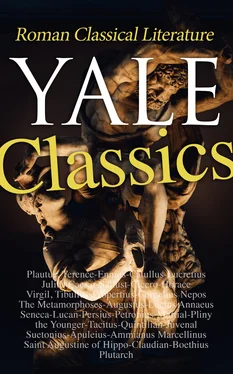FOOTNOTES
1The words in brackets are regarded by all the best critics as the production of some interpolator.
2That the allusion is to the islands of the Sirens, who tried to allure Ulysses to listen to their song, the commentators have already observed. Ellendt.
3 Quum erat in hac gente Magna illa Graecia , 'when Great Greece was in (or among) this people.' In hac gente, i.e. in Italis, among the Italians, or in Italy. Ellendt.
4In one of the tragedies of Pacuvius were represented two brothers, Amphion and Zethus, the former fond of philosophy, music, and the refined arts, the other of a rougher disposition, addicted to war and despising science. To this story Horace also alludes, Ep. i. 18. 41: Gratia sic fratrum geminorum Amphionis atque Zethi, dissiluit, donee suspecta severo Conticuit lyra. Fraternis cessisse putatur Moribus Amphion. B.
5In this passage I adopt the correction, or rather restoration, of Ellendt, Nam et omne, quod eloquimur, fit, ut id aut esse dicamus aut non esse. All other modern editions for fit have sic.
6Diogenes, and other Stoics like him. Proust.
7Terence, Andr. i. 1. 83. Colman's Translation.
8I follow Ellendt's text: Sic has ego argumentorum volui notas quaerenti demonstrare ubi sint. Orellius and most other editors have Sic has ego argumentorum novi notas, quae illa mihi quaerenti demonstrant, 'sententia perinepta' as Ellendt observes; for it was not what Antonius himself knew that was to be specified, but how he wished learners to be assisted.
9Pacuvius in his Hermione, as appears from Nonius v. flexanima. The thought is borrowed from Euripides, Hec. 816. Ellendt.
10See note on c. 28.
11See note on c. 47.
12The forefinger, which Crasaus is said to hare pointed with wonderful effect. See Quintilian, xi. 3. 94.
13 Spondalia . For this word I have given 'verses.' 'That it is corrupt,' says Ellendt, 'all the commentators agree.' Hermann, Opusc. i. p. 304, conjectures e sponda illa, 'from that couch,' on which he supposes Telamon may have been reclining.
14Quintus Servilius Caepio, in his consulship, says Henrichsen, had embezzled a large portion of the gold taken at the capture of Toulouse, 106 B.C. In the following year, when, through the disagreement between him and the consul Manlius, the Romans were defeated in two battles by the Cimbri, his property was confiscated, and his command taken from him. Some years afterwards, 95 B.C., when Crassus and Scaevola were consuls, Gaius Norbanus, then tribune of the people, brought Caepio to trial, as it appears, for the embezzlement of the gold at Toulouse, and for exciting sedition in the city. The senate, to whom Caepio, in his consulship, had tried to restore the judicial power, exerted themselves strongly in his behalf; but Norbanus, after exciting a great tumult, carried his point by force, and Caepio went into banishment at Smyrna.
15As Caepio had tried to take it out of the hands of the knights, and to restore it to the senate.
16Since public or common fear must affect individuals.
17 Quae si inflammanda sunt . An elegant mode of expresaion, for 'si ad animos invidia inflammandos adhibenda sunt tanquam faces.' Ernesti.
18 Exitus spissi et producti esse debent . 'Non abrupti, sed lenti.' Ellendt. 'Vehementes et longiores.' Proust.
19 Simul atque intuleris . Rem sc. 'As soon as you have introduced the subject.'
20Orellius's text has inferenda; many others, efferenda. There have been various conjectures offered, as infirmamda, evertenda, elevanda, infringenda. The reader may take his choice.
21 Cavillatio . Ironical or satirical humour seems to be meant.
22 Quippe; leve enim, etc. Quippe is equivalent to the Greek eikotōs. Ellendt.
23 Ne in rutis quidem et caesis . Ruta were such things as could be removed from houses and other premises without pulling down or damaging any portion of them; caesa, as Proust remarks, refers to the cutting down of trees.
24Gnaeus Domitius Ahenobarbus, in his tribuneship, 103 B.C., was hostile to the pontifices, because they had not chosen him in the place of his father, and proposed a law that those who were chosen by the pontifices into their body should not be appointed till their choice was sanctioned by the people. Veil. Pat. ii. 12; Suet. Ner. 2; Cic. Rull, ii. 7. He had some ability in speaking, but was not numbered among eminent orators. Cic. Brut. 45. Henrichsen.
Конец ознакомительного фрагмента.
Текст предоставлен ООО «ЛитРес».
Прочитайте эту книгу целиком, купив полную легальную версию на ЛитРес.
Безопасно оплатить книгу можно банковской картой Visa, MasterCard, Maestro, со счета мобильного телефона, с платежного терминала, в салоне МТС или Связной, через PayPal, WebMoney, Яндекс.Деньги, QIWI Кошелек, бонусными картами или другим удобным Вам способом.












